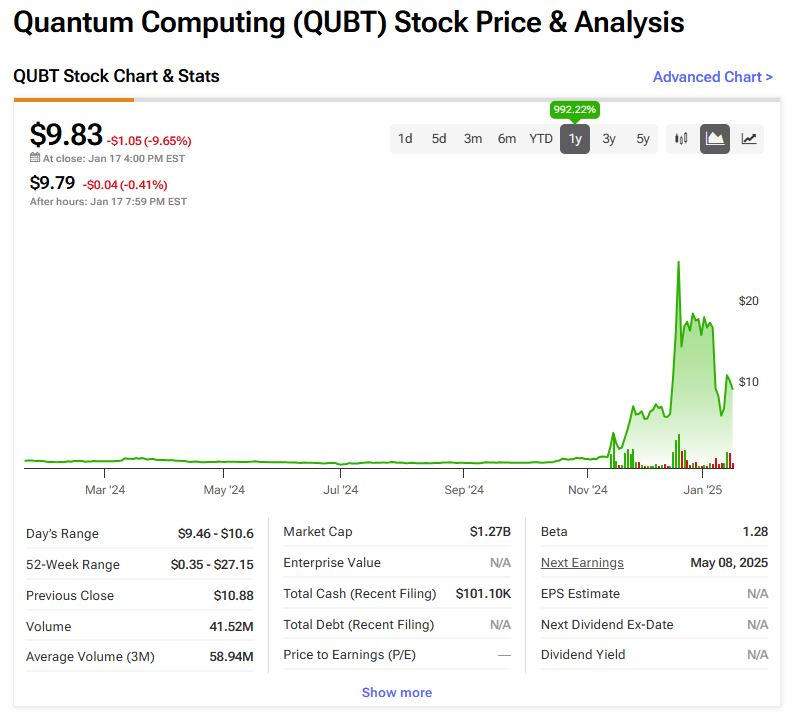Quantum Computing Inc (QUBT) stock has experienced explosive share price growth of almost 1,000% over the past year. Rightly, several market analysts are labeling it as hype without substance. While the company is one of many offering exposure to an exciting future in quantum computing, its operations remain a long way from commercialization and even further from profitability.
Therefore, I’m bearish on Quantum Computing because the valuation metrics are overextended, and a large cohort of quantum computing companies will likely struggle to raise capital before the quantum revolution becomes a reality. Consumers (end-users) are buoyant on quantum computing, but investors are struggling to find value. Given the elevated valuations, QUBT is a prime candidate for a short-medium-term sell-off.
QUBT’s Bull Run Is Unsustainable
Quantum Computing is an integrated photonics company leveraging its ‘entropy quantum computer’ technology to solve complex calculations and enhance cyber security. However, like many of its peers in a fledgling sector, the technology is still in the developmental stages. Yes, it offers groundbreaking advances in computing, but for the time being, these are mere promises without substance.
Despite the lack of tangibles, QUBT has experienced an insatiable bull run, with its stock price soaring by approximately 992% over the past 12 months despite shedding some of its gains recently. I believe hype and speculation drove this dramatic increase more than fundamental business performance.

The company’s financials underscore this contrast between its market valuation and actual revenue generation. With a current market capitalization of around $1.5 billion, Quantum Computing recently reported revenues of $100,000 in Q3 FY24 and $400,000 over the last year. Basic arithmetic suggests something doesn’t add up. Clearly, there is a disconnect between sales and valuation.
Moreover, the company’s burn rate is quite concerning, bleeding $5.1 million in each of the last two quarters. The currently elevated share price does provide an opportunity to raise more cash through equity sales, but this may alert some investors to the unsustainable nature of the current bull run.
Notably, some Wall Street analysts have questioned the company’s expertise, starting as a beverage company before pivoting to quantum computing in 2018.
QUBT Fails to Stand Out From the Crowd
Further reasons for my bearishness include the fact that Quantum Computing, despite its potential, is just one player in a crowded tech landscape. While companies like Quantum Computing have seen significant stock price increases, the industry is still in its infancy. Moreover, major tech giants with deep pockets, such as IBM (IBM), Google (GOOGL), and Amazon (AMZN), are investing heavily in quantum research and development, with IBM alone committing $100 million to university partnerships and aspirations of building the world’s first 100,000-qubit quantum-centric supercomputer.
The quantum computing market is projected to grow from $1.3 billion in 2024 to $5.3 billion by 2029. The large amount of spare capacity in an embryonic industry is attracting numerous startups, with over 200 emerging since 2013. Many smaller companies may struggle to achieve profitability due to high development costs, long research timelines, and intense competition.
Moreover, the enormity of the technical challenges in quantum computing, including error correction and scalability, will likely lead to market consolidation. As the industry matures, many smaller players may fail to survive and be unable to compete with the dominance of larger corporations.
Is Quantum Computing (QUBT) Overvalued?
Quantum Computing’s valuation is staggeringly high at current prices and is bordering on the irrational. With an enterprise value-to-sales ratio of 3,870x, QUBT is trading at a mind-boggling 113,008% premium to the information technology sector median. This astronomical valuation is further emphasized by its price-to-sales ratio of 2,550x, which is 78,186% higher than the sector median.
Moreover, the company’s price-to-book ratio of 18x is 427% above the sector median, indicating a severe overvaluation of its assets. As QUBT’s earnings remain negative, there is no meaningful P/E ratio. These rather unpalatable valuation metrics aren’t supported by substantial cash reserves either. The computing pioneer only has $3.1 million in cash against $7.8 million in debt.
Clearly, Quantum Computing relies on future growth, with plenty of investors happy to stay faithful for the long term. However, the problem is that expected growth is such a long way into the future that investing today may not be suitable for all investors. Current forecasts only run through to 2025, where predicted revenues suggest a P/S ratio of 935x.
Is Quantum Computing a Good Stock to Buy?
On Wall Street, only one analyst (Edward Woo) has rated the stock over the past three months, labeling QUBT as a Moderate Buy. The average QUBT stock price target is currently $8.50 per share, implying approximately 13.5% downside potential compared to current prices.

Short-Medium Term Downside Expected
I’m bearish on Quantum Computing (QUBT) because its valuation is severely detached from reality. The company faces intense competition from deep-pocketed tech giants, while its own financial position is relatively fragile, with negligible revenues and significant cash burn. The current market cap suggests a faith in growth that is years, if not decades, away.
Given the embryonic stage of quantum computing as an industry, the risks of execution failure, inevitable market consolidation, and overhyped projections — the near-term outlook for this futuristic stock is bleak. And while the stock has managed to attract and captivate speculative investors, its current bull run is unsustainable. At the same time, its astronomical valuation statistics aren’t likely to offer a strong investment case for investors until prices recede significantly or the company records substantial revenues.
















